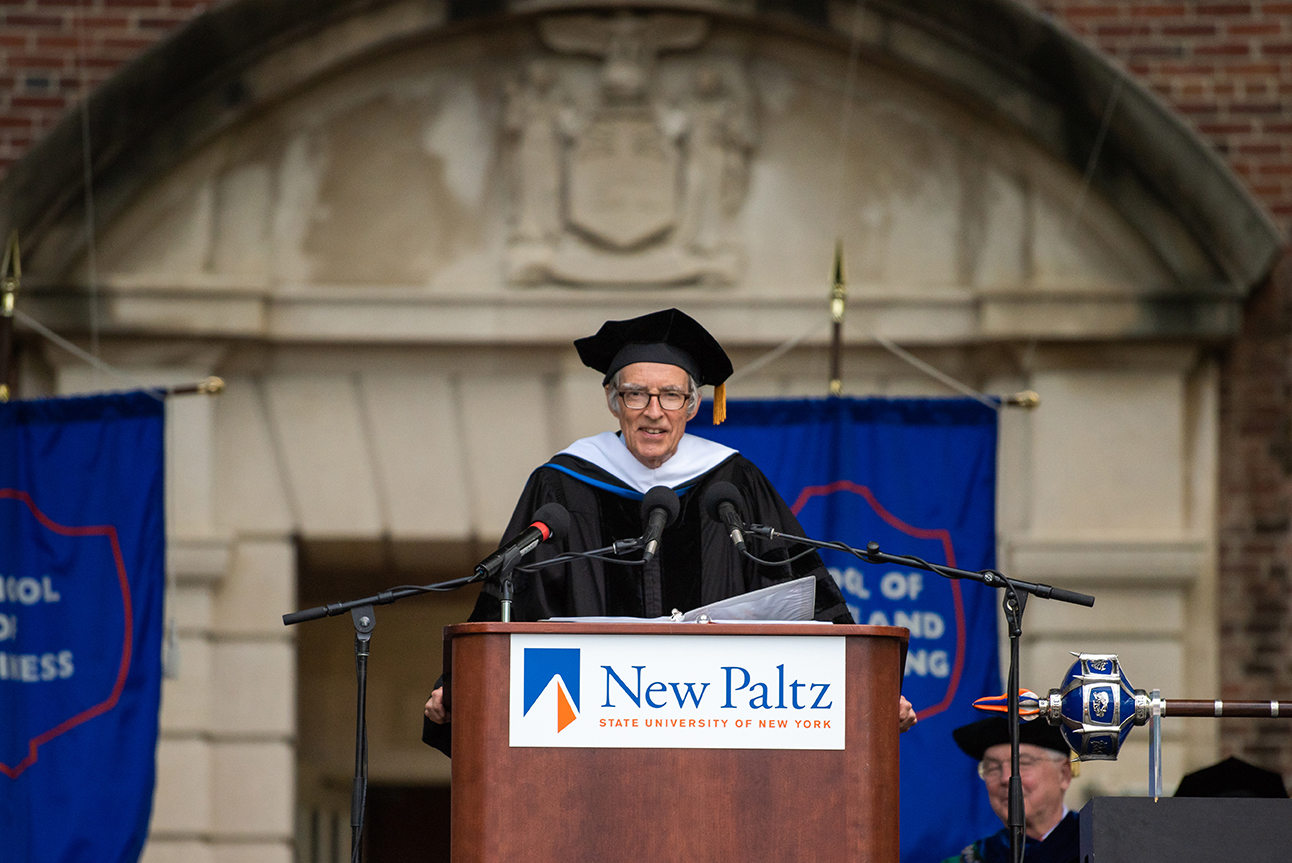Commencement Address: James H. Ottaway Jr. (Sunday, May 20, 2018)

The best graduation gift I can give you all is a short talk.
I thank President Don Christian for recommending this honorary degree, with no final exam.
It is rare to be honored in my own hometown for my life’s work, so this is a unique pleasure.
I celebrate you today for your hard-earned degrees and wish you success in your life’s work, starting tomorrow. I was lucky to start my life’s work in journalism as a cub reporter for a family-owned newspaper in Danbury, Connecticut. My first big story was reporting a Presidential Campaign speech by John F. Kennedy on the New Haven Green in October, 1960. Do the math. That was 58 years ago. My wife, Mary, who was an elementary education and later an art student at SUNY New Paltz, she and I just had our 80th birthdays. But we are still very concerned about politics and the health of our media and democracy.
You have the special privilege of graduating from this distinguished university; that gives you a special civic responsibility to help your country repair the damage done to our democracy by our present generation of political leaders.
So, I have three requests for some of your future time and energy.
First, we all need to be more active public citizens to make our democracy work better at all levels — as regular, educated voters, volunteer workers for candidates running for public office, or candidates for public office ourselves. Join your town’s planning or pubic parks board. Democracy requires citizen participation.
We have serious problems at state and national levels that present political parties and policies are not fixing. I heard Micah White, organizer of Occupy Wall Street, say at a conference on “Democracy in Dark Times” at Bard College that we have two ways to resist and reform our government — revolution in the streets or much more active citizen participation in our political process. The number of Americans who do not vote regularly is dangerous. More of us must vote and take part in government to create peaceful change.
Second, as educated citizens of our free society, we all have the responsibility and the skills to seek the truth and research the facts on public issues in debate. We should contradict family at the dinner table, friends at parties, and public officials, when they are making false statements, impossible promises, or wild exaggerations to support their positions. Be activists for the truth, for provable facts.
There are at least six reliable fact checking websites like Fact Check.Org or Snopes.com to help you correct false statements and so-called Fake News in all its Internet forms. Be a lot more careful about sharing with all your friends on Facebook news stories from sources you do not know or trust. They may come from Russia with evil intent.
In our age of often irrational public debate, which often deliberately ignores basic facts and scientific evidence, remember the advice of former Senator Daniel Patrick Moynihan of New York who once said, “You are entitled to you own opinions; you are NOT entitled to your own facts.”
To dig out verified facts from the overload of news and chatter on the Internet, we all need to make a bigger daily effort to escape our own “News Bubbles” of stories filtered by Facebook, Google, Twitter, which send us only news and opinions we agree with.
On the personal level, we can talk to people we know disagree with us on major issues, and make an honest effort to understand their points of view. If we do this with an open and curious mind, we might learn new facts, then test and adjust some of our own fixed opinions.
Third, we all need to exercise our own precious First Amendment right of free speech, and stand up for the free speech of people we disagree with. Free public debate, open to all points of view, is essential to a working democracy. You STEM discipline students, trained to prove your theories with factual evidence, will have special knowledge about some public issues. You can contribute valuable facts to policy debates by speaking out in public, speaking truth to power.
Finally, you should be proud of yourselves for defending the right of free speech on your campus. You have not shouted down invited speakers, or forced them off their podiums, or disinvited any commencement speakers (not yet anyway) as many students at other American colleges and universities have done, where Presidents or Deans did not have the courage to insist on campus free speech.
President Christian did. He said in his August, 2017, State of the College address, “My support for free speech on campus does not mean that I agree with all views expressed or that I afford moral equivalency to all views. However, as a public university, we are bound to uphold the First Amendment… even when it hurts, upsets, or offends people.”
As a former chairman of the World Press Freedom Committee, I applaud President Christian’s strong, clear statement on the importance of free speech on this campus. And I thank him for allowing me to exercise that free speech with you today.
Congratulations and good luck to you all.
